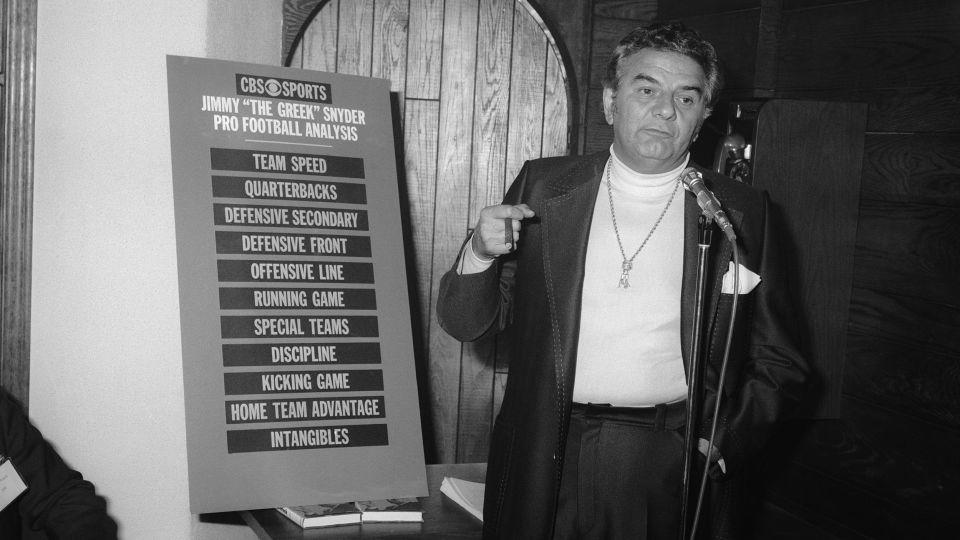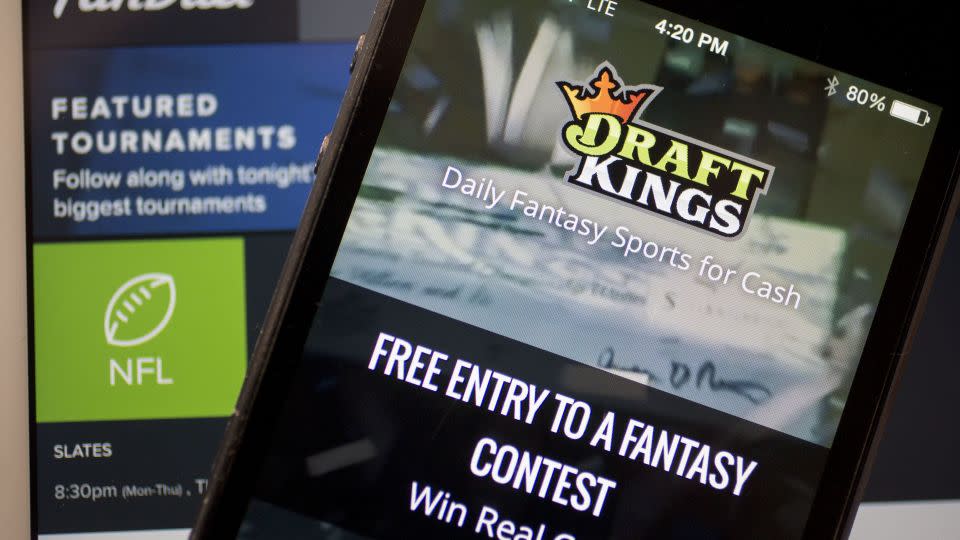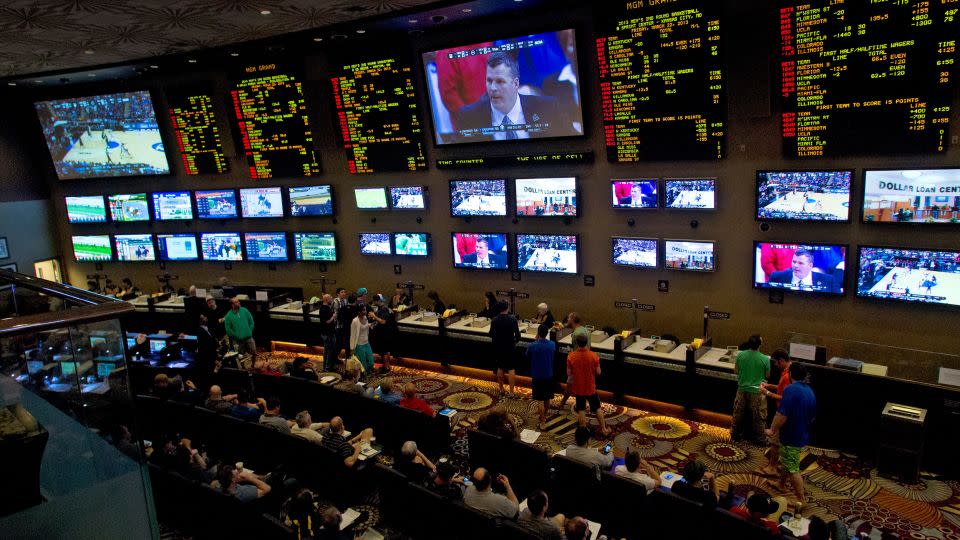Sports betting is exploding. Here’s how it works
Are you feeling lucky? This Sunday, millions of viewers will be glued to the Super Bowl, but they won’t just be watching for the football. They’ll have money — sometimes thousands of dollars — on the line.
Americans wager billions of dollars on the Super Bowl, the year’s biggest day for sports betting. But in recent years, since the Supreme Court allowed states to legalize gambling on sports in 2018, the industry has exploded.
Experts say this has changed the way we watch games, including the Super Bowl.
Casual fans tuning in to Sunday’s game between the Kansas City Chiefs and the San Francisco 49ers may be bewildered by the onslaught of ads for betting sites and apps. The sheer number of possible bets also has skyrocketed. Fans can venture far beyond simple point-spread bets to wager on things like:
Who will win the coin toss? Which player will score the first touchdown? Will Christian McCaffrey rush for more than 90 yards? And, most importantly, what color of Gatorade will be dumped on the winning coach?
Even people who know nothing about football can get in on the Super Bowl betting action with something called a prop (short for “proposition”) bet on, say, how long Reba McEntire will take to sing the national anthem.
Here’s a closer look at how sports betting works and how it can affect fans’ interest in the game.
What is sports betting?
Although many fans place bets with each other or in small groups, most legal sports betting now happens in online sportsbooks. Some sites are legal and some are not, but hundreds of betting options are available for people to choose from.

Most are football-centric bets, like which team will lead at halftime or, say, how many yards 49ers receiver Brandon Aiyuk will gain on his first reception.
Others have nothing to do with football at all, like how many songs Usher will sing at halftime or which Kansas City Chiefs star will be seen first in a State Farm ad.
One sportsbook is offering more than 50 bets alone for pop star Taylor Swift, who is expected to be there supporting her boyfriend, Chiefs tight end Travis Kelce. Among them: How many times will she be shown on the TV broadcast? Will she wear a foam finger? These types of prop bets are usually limited to smaller amounts to prevent insiders from cashing in.
The vast range of wagers reflects the recent surge in sports betting, which is now legal in 38 states. Ads for apps and sites like Draft Kings and FanDuel are everywhere, pitched by entertainers and sports figures such as Kevin Hart and Rob Gronkowski.
Betting has always been intertwined with sports, experts say. Even on sports television, it’s been an open secret. In the 1970s, CBS NFL commentator Jimmy “The Greek” Snyder would predict the scores of games on air, a sly way to give bettors insight into his picks and which bets to take.

The popularity of the college basketball tournament informally known as March Madness has long revolved around gambling — how’s your bracket? — while the NFL has gained audiences for years because of the millions of people playing fantasy football.
But in 2024, betting on sports is all out in the open.
“Now, we get the Kevin Hart commercials,” said Jason Kido Lopez, a professor at the University of Wisconsin-Madison who studies sports media. “But that doesn’t mean (betting) wasn’t always at work and it wasn’t always having an effect.”
Podcasts dedicated to sports gambling have slews of dedicated listeners searching for insights on where to place their money. Even big-name sports broadcasters have gotten in on the action: Last year, ESPN launched its own online sportsbook, further blurring the line between covering the games and betting on the games.
How sports bets work
Like any industry, sports betting has its own terminology. A “point spread” is a term that usually dictates one team as the underdog and the other as the favorite, and gives a number of points needed to level the metaphorical playing field.
For example, most betting sites consider the 49ers to be 2-point favorites over the Chiefs — in other words, experts expect them to beat the Chiefs by about 2 points. So if you’re making a bet on the Niners against the spread, they must not only win the game but win by more than 2 points.
This form of betting stands in contrast to the “money line,” which refers to simply betting on one team to beat another. Experts say implementing a spread can make a potentially lopsided game more suspenseful and keep fans watching til the end even if one team is way ahead.

So why does this matter? The spread was invented because of football and has helped bring more interest to NFL games, particularly matchups thought to be blowouts, Lopez said.
Prop bets are used for specific aspects of a game, like whether Chiefs quarterback Patrick Mahomes will throw more than two touchdowns. This began as a way to make betting more lucrative.
Such bets have grown to include wagers not related to the game itself. Some sites this week are even taking bets on what color lipstick Taylor Swift will wear to the stadium (red appears to be the favorite) and whether Kelce will propose to her after the game.
“The same mechanisms that keep people engaged in sports media makes the league more lucrative,” Lopez said. “Because now more people are going to be engaging with it, doing research in it, and more people are willing to watch games fully or watch games they wouldn’t normally watch.”
Some fans say gambling adds more fun to sports. It also may be addictive
In many ways, sports betting is becoming another sports-adjacent game, Lopez said, similar to playing fantasy football or filling out a bracket. For many people, betting on sports has become secondary nature.
“I already love sports, so betting some money among friends is just more of that,” said Ben Ellicot, 41, of Austin, Texas. Ellicot told CNN he uses betting sites to wager on football games. “It’s not serious, it’s more like a little dopamine hit and getting to use knowledge I already have.”
But for some, sports betting has its pitfalls. At the end of every ad for betting apps is a number to call for help with a gambling addiction.
Is the sports industry now promoting something that could be harmful to fans?
For now, it’s too early to tell, said Ken C. Winters, a scientist at the Oregon Research Institute who studies addictive behaviors. In the past, data has suggested that previous expansions of gambling have not led to a significant rise in the proportion of people with a gambling problem, he said. Most adults learn to adapt, Winters said, limiting their gambling and avoiding any trouble.

There’s anecdotal evidence so far that most people treat sports betting as a recreational activity with small stakes and don’t jeopardize their finances, Winters said.
“I bet on sports because of the angst/anxiety that comes from hoping for something,” said Sam Williams, a 36-year-old dad in Winston-Salem, North Carolina, who’s active in several online sports communities. “Nothing like sweating a five-team parlay for 50 cents that could win you $15.”
When you’re gambling in a casino or on the lottery, the game is randomized — there’s often no real strategy, just chance. But betting on sports is different. Students of the game think they can sometimes predict what will happen, which in theory gives them a better chance to win.
“There’s … a belief (among some fans) that one’s interest and background in sports can create an advantage over the betting industry,” Winters said.
To gain an edge, fans study analytics, listen to podcasts and get picks from trusted experts. All of that feeds the perception that sports can be predicted, thus making sports betting different from regular gambling.
That illusion of control feeds the larger ecosystem around sports betting. And it changes the way fans interact with the sport, experts say.
Sports betting is an information game, Lopez said. It’s not just about cheering for a team — it’s also about gathering insight on how that team plays.
Lopez used the San Francisco 49ers as an example. Fans who bet on the 49ers might study the team more deeply than those who don’t. For example, how do McCaffrey and the 49ers’ offensive line match up with the Chiefs’ defense?
“It just changes the way that I might look at the game when I’m searching for the information to make a good prediction,” Lopez said.
So on Sunday, fans who bet on the Super Bowl might be watching the game a little differently than those who didn’t.
For more CNN news and newsletters create an account at CNN.com

